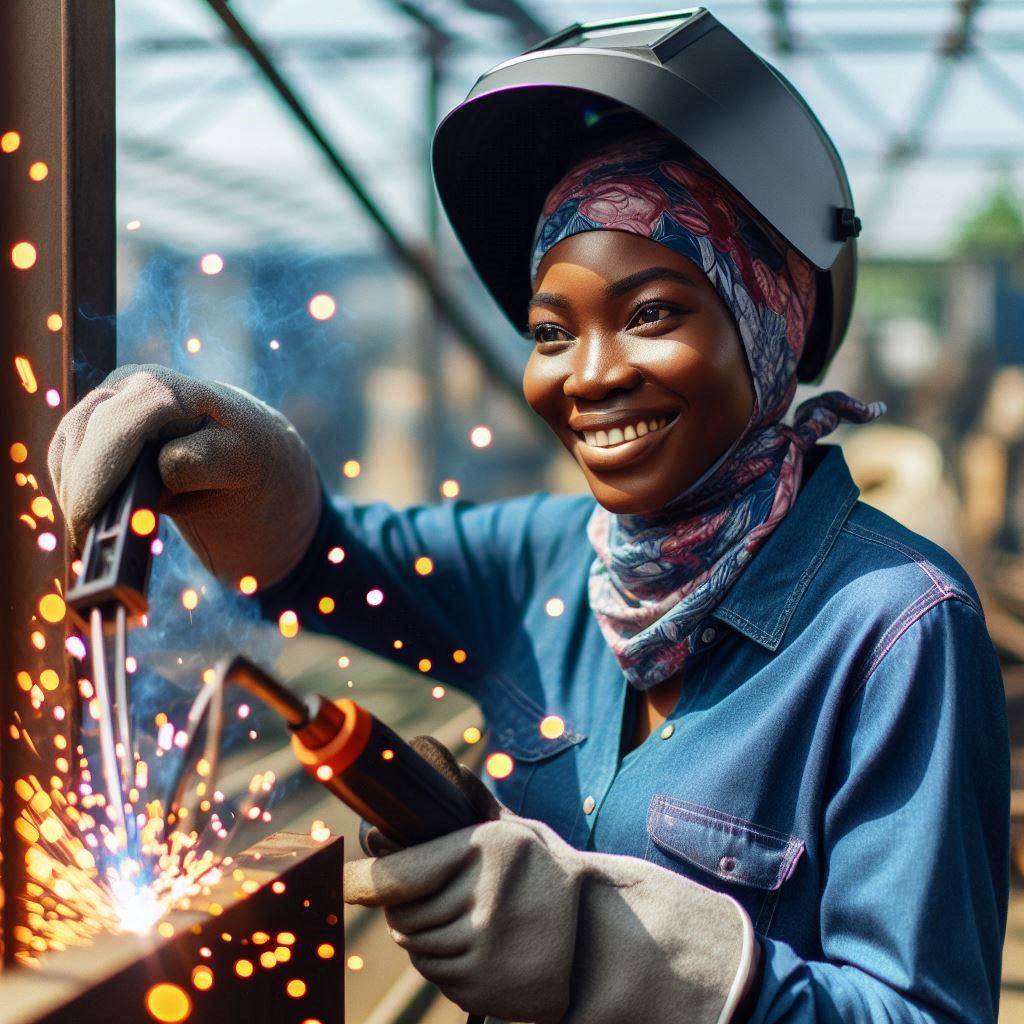Introduction
Welding in Nigeria is a vital industrial process crucial for infrastructure development and economic growth.
From construction to manufacturing, welding plays a pivotal role in joining metals, ensuring structural integrity, and enhancing product durability.
Overview of Welding in Nigeria
In Nigeria, welding techniques have evolved significantly over the years, keeping pace with global advancements.
Initially driven by manual methods, the industry has embraced modern technologies to meet diverse industrial demands efficiently.
Welding techniques are indispensable in various industries across Nigeria. In the construction sector, welders fabricate and assemble metal structures, bridges, and buildings, ensuring strength and safety.
Infrastructure projects rely heavily on precise welding for stability and longevity.
In manufacturing, welding is crucial for producing machinery, vehicles, and consumer goods. Automotive assembly lines depend on spot welding for vehicle frames, ensuring robustness and safety standards.
The oil and gas industry utilizes welding extensively for pipelines, rigs, and refineries.
Welding ensures that critical infrastructure withstands harsh environments and operational stresses, maintaining operational continuity and safety standards.
Role in Agriculture and Mining
Agricultural equipment, essential for Nigeria’s agrarian economy, requires welding for fabrication and repair.
Mining operations depend on welded structures for machinery used in extraction and processing, ensuring efficiency and durability in rugged terrains.
Advancements in welding technology have enhanced productivity and precision. Automated welding systems streamline production, reducing labor costs and improving quality control.
Robotics and computerized welding machines have revolutionized efficiency in large-scale manufacturing and complex fabrications.
Despite technological strides, challenges such as skills gaps and equipment maintenance persist.
Training programs and certifications are essential to enhance skills among welders, ensuring safety and competence in the workplace.
Innovations in welding materials and techniques continually improve weld quality and longevity, addressing industry-specific challenges.
Environmental sustainability is increasingly important in welding practices. Techniques like laser welding reduce material waste and energy consumption, contributing to eco-friendly manufacturing processes.
Adhering to environmental regulations ensures responsible use of resources and minimizes ecological impact.
In general, welding techniques in Nigeria are indispensable across diverse sectors, driving industrial growth and infrastructure development.
As technologies evolve and we address challenges, welding ensures structural integrity, safety, and sustainability, remaining paramount.
Embracing innovation and skill development will further elevate Nigeria’s welding industry, contributing to economic resilience and technological advancement on the global stage.
Shielded Metal Arc Welding (SMAW)
Definition of SMAW
Shielded Metal Arc Welding (SMAW), commonly known as stick welding, is a manual arc welding process that uses a consumable electrode coated in flux to lay the weld.
The flux coating melts during welding, creating a shielding gas and slag that protect the weld pool from atmospheric contamination.
In SMAW, the welder holds the electrode holder (or “stick”) connected to the power source and initiates an arc between the electrode and the workpiece.
The heat generated melts both the electrode and the base material, forming the weld bead. As the weld progresses, the flux coating disintegrates, producing a protective gas shield and a slag layer that insulates the weld as it cools.
Pros and Cons of SMAW
Pros
- Versatility: Can be used in various positions and environments, making it suitable for remote areas in Nigeria.
- Simple Equipment: Requires basic equipment and is relatively inexpensive to set up.
- All-Position Welding: Effective in vertical, overhead, and horizontal positions, enhancing its utility.
Cons
- Slag Removal: Requires post-weld slag removal, which can be time-consuming.
- Weld Quality: May produce welds with higher porosity compared to other methods.
- Skill Dependent: Operator skill greatly influences weld quality and efficiency.
Applications in Nigeria
Nigeria’s industrial and construction sectors widely apply SMAW due to its robustness and adaptability to challenging conditions.
- Pipeline Construction: SMAW is crucial for welding pipelines across Nigeria’s vast landscapes, ensuring secure joints resistant to environmental stresses.
- Infrastructure Development: Used in the fabrication of bridges, buildings, and other critical infrastructure projects nationwide.
- Repair and Maintenance: Ideal for repair work on agricultural machinery, vehicles, and equipment in rural areas where access to advanced welding methods may be limited.
- Artisanal and Small-Scale Enterprises (ASEs): Many ASEs in Nigeria rely on SMAW for general fabrication and repair services, supporting local economies and livelihoods.
In summary, Shielded Metal Arc Welding (SMAW) remains a cornerstone of welding practices in Nigeria, valued for its simplicity, versatility, and robustness.
Despite its challenges, such as slag removal and skill dependence, SMAW continues to play a vital role in infrastructure development, industrial growth, and rural enterprise support throughout the country.
As technology evolves, SMAW’s foundational importance ensures its enduring relevance in Nigeria’s welding landscape, empowering artisans and professionals alike to contribute to the nation’s development with confidence and capability.
Read: Essential Tools for Telecom Engineers in Nigeria
Gas Metal Arc Welding (GMAW)
Definition of GMAW
Gas Metal Arc Welding (GMAW), also known as Metal Inert Gas (MIG) welding, is a welding process where an electric arc forms between a consumable wire electrode and the workpiece.
The arc heats the workpiece and melts the wire, which deposits molten metal, creating a weld.
How GMAW Works
In GMAW, a shielding gas, typically argon or an argon-carbon dioxide mix, protects the weld area from atmospheric contamination.
A wire electrode continuously feeds through a welding gun, creating an arc by passing electric current between the electrode and workpiece.
As the electrode wire is fed into the weld pool, it melts and forms the weld bead.
Pros and Cons of GMAW
Pros
- High Productivity: GMAW allows for high welding speeds and can be used on a variety of metals and thicknesses.
- Quality Welds: It produces clean welds with minimal spatter, resulting in less post-weld cleanup.
- Versatility: Suitable for both thin and thick materials, making it widely applicable across industries.
- Less Skill Required: Compared to some other welding techniques, GMAW is easier to learn and execute effectively.
Cons
- Equipment Sensitivity: The process can be sensitive to wind and drafts due to the shielding gas.
- Initial Setup Costs: Setting up a GMAW system can require significant investment in equipment and gases.
- Limited Outdoors: It is less suitable for outdoor welding unless wind and weather conditions are controlled.
Applications in Nigeria
In Nigeria, GMAW finds extensive application across various sectors:
- Manufacturing Industry: Used in fabricating metal structures, machinery, and equipment assembly.
- Construction: Ideal for welding steel structures, frames, and pipelines with precision and speed.
- Automotive Repair: Commonly used for repairing vehicle bodies and exhaust systems.
- Shipbuilding: Effective in constructing and repairing metal hulls and structural components of ships.
- Oil and Gas Sector: Welding pipelines, platforms, and infrastructure components due to its efficiency and quality.
Gas Metal Arc Welding (GMAW) stands out in Nigeria as a versatile and efficient welding technique.
Its ability to handle various materials and produce high-quality welds makes it indispensable across industries from manufacturing to construction and automotive sectors.
While initial setup costs and sensitivity to environmental conditions pose challenges, the benefits of productivity and weld quality outweigh these drawbacks.
As Nigeria continues to develop its industrial capabilities, GMAW will play a crucial role in meeting welding demands effectively and reliably.
Read: Women in Nigerian Telecommunication Engineering
Gas Tungsten Arc Welding (GTAW)
Gas Tungsten Arc Welding (GTAW), commonly known as TIG (Tungsten Inert Gas) welding, is a precise and versatile welding process widely used in Nigeria.
This method utilizes a tungsten electrode to produce the weld and is known for its high-quality results.
Definition of GTAW
GTAW involves the use of a non-consumable tungsten electrode to create the weld. The electrode, which doesn’t melt, creates an arc that generates the heat needed for welding.
A shielding gas, typically argon or helium, protects the weld area from atmospheric contamination.
How GTAW Works
In GTAW, the welder holds the tungsten electrode in one hand and feeds a filler rod with the other hand into the weld puddle. The arc produces intense heat, melting the base metal and the filler rod (if used), forming a strong bond between the materials.
The process requires precise control of both the electrode and the filler material to achieve accurate welds.
Pros and Cons of GTAW
Pros
- High Quality: GTAW produces clean, precise welds suitable for applications requiring aesthetic appeal or strict quality standards.
- Versatility: It can weld a wide range of metals, including stainless steel, aluminum, copper, and titanium.
- Control: Operators have excellent control over the welding parameters, allowing for intricate welds and thin materials.
Cons
- Complexity: GTAW requires more skill and experience compared to other welding methods due to its precision demands.
- Speed: It is generally slower than processes like MIG welding, making it less suitable for high-volume production.
- Cost: Equipment and consumable costs can be higher compared to other welding methods, impacting initial setup expenses.
Applications in Nigeria
GTAW finds extensive use across various industries in Nigeria due to its ability to produce high-quality welds and its versatility with different metals. Some common applications include:
- Oil and Gas Industry: GTAW is used for welding pipelines, tanks, and critical components where strength and corrosion resistance are crucial.
- Construction: It is employed in the fabrication of architectural structures, stainless steel balustrades, and aluminum frameworks.
- Aerospace: GTAW is preferred for welding aircraft components and parts due to its ability to weld thin materials without distortion.
- Automotive: In Nigeria, GTAW is used for welding exhaust systems, aluminum body panels, and other critical automotive components requiring precise welds.
- Power Generation: It is utilized in the fabrication and repair of turbines, heat exchangers, and other components in power plants.
In essence, Gas Tungsten Arc Welding (GTAW) stands out in Nigeria for its capability to deliver high-quality welds across a wide range of metals.
While it requires skill and investment, its precision and versatility make it indispensable in industries where weld quality is paramount.
Read: Role of ICT in Nigerian Telecommunication Engineering

Flux-Cored Arc Welding (FCAW)
Flux-Cored Arc Welding (FCAW) stands out as a versatile welding technique widely utilized in Nigeria for its efficiency and adaptability in various applications.
Definition of FCAW
FCAW is a semi-automatic or automatic arc welding process. It utilizes a tubular electrode filled with flux, which protects the molten weld pool from atmospheric contamination.
How FCAW Works
In FCAW, the electrode’s flux creates a shielding gas around the arc. As the electrode melts, it releases a flux that forms a protective slag over the weld pool, preventing oxidation and ensuring strong weld joints.
Pros and Cons of FCAW
Pros
- High Deposition Rates: FCAW allows for rapid welding due to its high deposition rates, making it suitable for projects requiring speed.
- All-Position Welding: It excels in welding positions, including overhead and vertical, providing flexibility in challenging environments.
- Good Penetration: FCAW offers deep weld penetration, ensuring strong, durable welds even in thick materials.
Cons
- Potential Slag Inclusion: Improper technique can lead to slag inclusions in the weld, requiring careful cleaning and inspection.
- Sensitive to Wind: Wind can disrupt the shielding gas, affecting weld quality, necessitating sheltered environments or additional shielding.
- High Heat Output: FCAW generates significant heat, demanding proper ventilation and heat management to prevent overheating of materials.
Applications in Nigeria
FCAW finds extensive applications across various industries in Nigeria, owing to its effectiveness in diverse conditions and materials.
- Construction Sector: In building infrastructure and structural projects, FCAW’s high deposition rates and versatility are highly advantageous.
- Oil and Gas Industry: FCAW is used for pipeline welding and repairs, where its ability to weld in various positions is crucial for maintenance and construction tasks.
- Automotive Repairs: Automotive workshops utilize FCAW for repairing metal structures and fabrications due to its efficiency and ease of use.
- Shipbuilding: The marine industry employs FCAW for constructing and repairing ships, leveraging its capability to weld thick materials efficiently.
- General Fabrication: From manufacturing equipment to fabricating metal components, FCAW is preferred for its speed and robust weld quality, meeting the demands of Nigerian industries.
In a nutshell, Flux-Cored Arc Welding (FCAW) stands as a reliable choice in Nigeria’s welding landscape, offering high productivity and versatility across various sectors.
While it has its challenges, its benefits in terms of speed, penetration, and adaptability make it indispensable for modern welding applications.
As industries in Nigeria continue to evolve, FCAW remains a cornerstone in meeting welding challenges effectively and efficiently.
Read: Electrical Engineering Licensing Process in Nigeria
Submerged Arc Welding (SAW)
Submerged Arc Welding (SAW) is a highly efficient welding process widely used in Nigeria for its productivity and reliability.
Definition of SAW
SAW involves melting the welding arc between a continuously fed bare electrode and the workpiece. The arc is completely submerged under a blanket of granular flux.
How SAW Works
Electric current passes through the electrode, generating an arc that melts the electrode tip and forms a molten pool on the workpiece. The flux blanket shields the arc and weld pool from atmospheric contamination.
This method is ideal for high-deposition welding on thick materials, ensuring deep penetration and strong weld joints.
Pros and Cons of SAW
Pros
- High Productivity: SAW can deposit welds rapidly, making it suitable for large-scale projects.
- Excellent Weld Quality: The process produces sound welds with good mechanical properties.
- Minimal Fume Emission: As the arc is submerged, it reduces smoke and fume levels, improving the working environment.
- Versatility: SAW can weld a variety of materials, including carbon steels, stainless steels, and some alloys.
Cons
- Limited to Flat or Horizontal Position: SAW is less effective in vertical or overhead positions due to the flux layer.
- Equipment Complexities: The setup requires specialized equipment, including flux handling systems.
- Initial Setup Costs: Initial investment in equipment and flux can be high, affecting smaller operations.
Applications in Nigeria
In Nigeria, SAW finds extensive use across several industries due to its efficiency and versatility.
- Shipbuilding and Offshore Structures: SAW is favored for welding thick plates and structures due to its high deposition rates and deep penetration capabilities.
- Construction of Pressure Vessels: The process ensures strong, reliable welds on pressure vessel seams, meeting stringent safety standards.
- Oil and Gas Pipelines: SAW is employed for welding pipeline segments efficiently, ensuring weld integrity and reliability over long distances.
- Infrastructure Projects: Bridges, dams, and industrial buildings benefit from SAW’s ability to weld large sections quickly and reliably.
- Manufacturing of Heavy Machinery: SAW is utilized in fabricating heavy machinery components, providing durable welds that withstand operational stresses.
In review, Submerged Arc Welding (SAW) stands out in Nigeria’s welding landscape for its ability to deliver high-quality welds efficiently.
Despite its limitations in position flexibility and initial costs, its widespread applications in critical industries underline its importance in infrastructure development and industrial growth.
As technology evolves, SAW continues to adapt, ensuring it remains a cornerstone of Nigeria’s welding techniques.
Conclusion
Recap of the Top Welding Techniques Used in Nigeria
Nigeria’s welding industry thrives on several key techniques. Shielded Metal Arc Welding (SMAW) remains predominant, prized for its versatility and simplicity.
Gas Metal Arc Welding (GMAW), celebrated for its speed and efficiency, also holds a significant place. Flux-Cored Arc Welding (FCAW) gains ground due to its effectiveness in outdoor conditions.
Tungsten Inert Gas Welding (TIG), known for its precision, is favored in industries demanding high-quality welds.
Submerged Arc Welding (SAW), ideal for thick materials, remains crucial in infrastructure projects. Each technique offers unique advantages tailored to diverse project requirements.
Importance of Choosing the Right Technique for Specific Projects
Selecting the appropriate welding technique is paramount for project success. SMAW suits construction and maintenance due to its robustness in adverse environments.
GMAW proves invaluable in automotive and manufacturing sectors where speed and efficiency are critical. FCAW’s ability to handle thicker materials makes it ideal for shipbuilding and structural fabrication.
TIG’s precision makes it indispensable in aerospace and nuclear applications. SAW’s efficiency in large-scale welding makes it a staple in bridge and pipeline construction.
Matching the technique to project specifics enhances productivity, quality, and cost-effectiveness.
Transform Your Career with Expert Guidance
Get personalized mentorship consulting that’s tailored to your unique path. Our expert advice is actionable and exclusive.
Get StartedFuture Trends in Welding Technology in Nigeria
Looking ahead, technological advancements will transform Nigeria’s welding industry. Automation and robotics will revolutionize production processes, enhancing efficiency and safety.
Advanced materials and alloys will demand innovative welding techniques to ensure structural integrity and performance.
Digitalization and data-driven approaches will optimize welding parameters, improving accuracy and consistency.
Training and upskilling programs will become pivotal as technology evolves, ensuring a skilled workforce capable of harnessing new technologies.
Sustainable practices will gain prominence, with eco-friendly welding methods and materials reducing environmental impact.
Collaboration with global partners will foster knowledge exchange, driving continuous improvement in welding practices nationwide.
In closing, Nigeria’s welding landscape is dynamic, characterized by a diverse array of techniques tailored to specific project requirements.
Choosing the right technique is crucial, influencing project outcomes in terms of quality, efficiency, and cost-effectiveness.
As technology advances, the industry will embrace automation, digitalization, and sustainable practices, ensuring competitiveness and growth in the global market.
Nigeria focuses on innovation and skill development, preparing to meet future challenges and opportunities in welding technology effectively.




